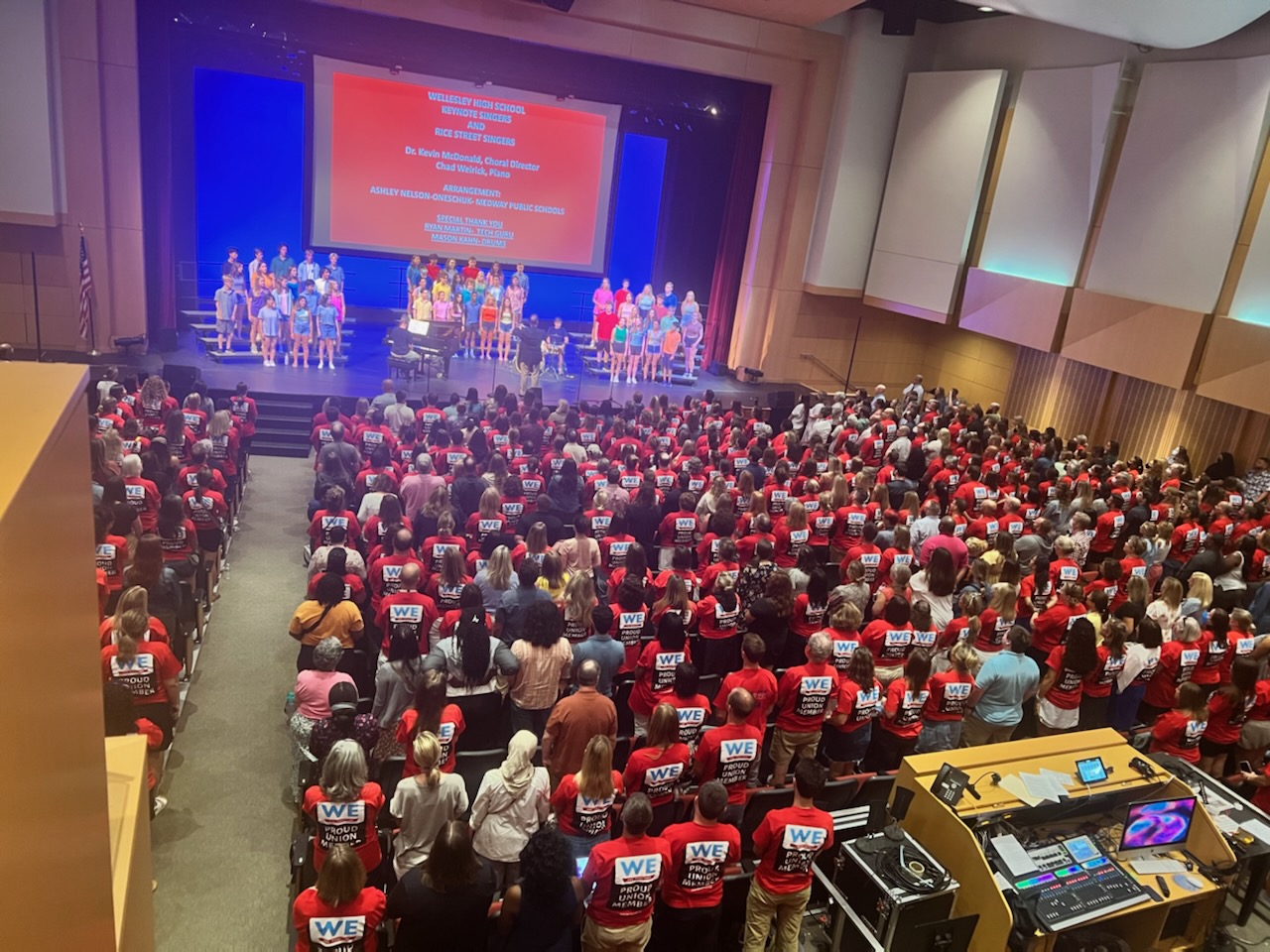Due to scheduling difficulties during the summer, the WEA and the WPS decided to put negotiations on hold until the start of this school year. Photo by William Liu
On June 30, the three-year contracts encompassing all staff and faculty in the Wellesley Public Schools system expired. Since the subsequent contracts had not yet been completed, the Wellesley Educators Association (WEA) and the School Committee mutually agreed to put the collective bargaining process on hold for the summer. As negotiations continue after resuming in late August, all Wellesley Public Schools faculty and staff are currently working outside of their contracts.
Collective bargaining is a process of negotiations between a collective of employees, in this case, the WEA and their employers, the WPS, seeking to reach agreements on working conditions, benefits, and certain rights. The WEA, the largest labor union in Wellesley, represents the interests of all WPS faculty and staff except for the principals and superintendent while the School Committee advocates for the interests of the school district.
The WEA consists of five separate bargaining units, each with their own contract reflecting their needs and circumstances. Unit A includes all full-time and part-time teachers, school counselors, librarians, special educators, nurses, and anyone else with a teaching license or special certification. Unit B includes all school administrators, such as assistant principals and department heads, with the exceptions of principals and the superintendent. Unit C is the instructional support professionals and paraprofessional educators, and Units D and E deal with secretarial staff.
With the 2021-2022 school year marking the last year of the previous collective bargaining agreement, both groups have been meeting weekly in-person to work towards a new agreement.
“Typically, we’re agreeing to agendas collaboratively and exploring language, doing some brainstorming, offering different perspectives on issues, so it’s a lot of two-way conversation happening among the teachers who are present, the principals who are present, from both the WEA and the school administration,” said superintendent of the Wellesley Public Schools, Dr. David Lussier.
A key issue for these negotiations has been dealing with the nationwide shortage of teachers, especially educational support professionals [e.g. custodians, bus drivers, or food workers],with many potential educators drifting to other fields in search of better pay. In the state of Massachusetts, teachers make 20.5% less than other comparable college-educator workers.
“If people can go to different fields and get more money and the cost to become a teacher stays the same, and it’s the same as the cost to get a business degree as an education degree but the pay is drastically different, that’s something that’s been weighing on people’s minds a lot. It really speaks to an overall deprofessionalization that we see of the work across the country,” said Mr. Kyle Gekopi, president of the WEA.
In order to combat this, the WEA has emphasized the importance of Massachusetts’ ballot Question 1, a proposed increase of taxes on top earners to fund quality public education and infrastructure.
“We’re really interested in the Fair Share Amendment. That is question one on the ballot, and so the WEA is in full support of question one. Our hope is that additional revenue that is created by that will help solve some of the teacher shortage and [educational support professional] shortages that are out there,” Gekopi said.
In a typical negotiating cycle, the WEA and WPS agree to a new contract before the expiration of the prior one. Beginning in winter, the two parties had begun negotiations with the hope of finishing by the end of the school year. However, as a result of the lingering burden of the COVID-19 pandemic on school operation, the two parties had to divert much of their focus from negotiating.
Furthermore, compounded with the impact of the pandemic, this particular cycle of collective bargaining has presented another major obstacle: negotiating all five contracts at once. While in years past, multiple contracts have been negotiated at the same time, this is the first cycle in which the contracts for all five units have been discussed at once.
“I think we agreed the task before us started to get really, really big: We’ve never negotiated five contracts simultaneously before in that way. So there were lots and lots of issues. Folks took it seriously, we did our best to get through,” Lussier said.
And while no definite timetable has been set, both groups are optimistic about the negotiations.
“I believe in the good will of both sides and that this is a fantastic place to work over the eleven years that I’ve been here. I know that they will come to an agreement that represents both of us, and I feel like this community is one too as they become more aware of these issues and the specific needs of the teachers, we’ll rise to the occasion, so I’m really hopeful about this as well,” said Ms. Jennifer Despo, a history teacher at the high school.
“I think both sides have an interest in wanting to get there as soon as we can. At the same time, these issues are often complex. I think our history is to arrive at good and equitable agreements that help maintain excellence for kids throughout the system. I’m confident that’s going to happen again here ” said Lussier
Although the delay in finalizing contracts has not been ideal for either party, both are confident and in agreement that the final product of their bargaining aims to continue to create a healthy environment for everyone in the Wellesley Public Schools community: teachers, students, parents, and faculty alike.
“We’re going to be trying to do the best for students. A positive working environment and working conditions for teachers is also good for students too. When teachers have time to plan, and grade all of their assignments, we can actually see some really positive results,” said Gekopi.

